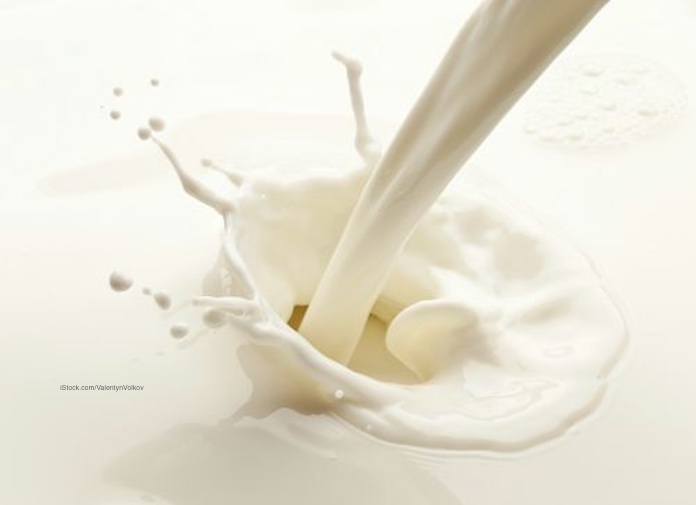Over the years, Food Poisoning Bulletin has received many, many messages from people defending raw milk consumption. Every one of these messages has used the claim, “I have drunk raw milk for years and I have never gotten sick.”
There are several problems with that statement: one is the logical fallacy of a small sample size. But first, some history.

There is a Salmonella outbreak that was just discovered in Washington state. Raw milk from Pride & Joy Dairy has teated positive for a rare strain of Salmonella Dublin that sickened and hospitalized two people in that state in January 2017. The dairy’s license to sell raw milk was pulled by the Washington State Department of Health.
Raw milk has been consumed by people for many years. And many people have been sickened and killed by the pathogenic bacteria and viruses found in that product. Before pasteurization was developed, millions of people all over the world died of tuberculosis, scarlet fever, typhoid fever, and illness from pathogenic bacteria transmitted through raw milk.
Pasteurization was developed in the late 1890s. This process was first used in the U.S. in the 1920s; it became widespread by the 1950. Before 1938, outbreaks from raw milk comprised 25% of all food poisoning outbreaks in the United States. Now, when pasteurization is ubiquitous, milk is linked to less than 1% of all food poisoning outbreaks (1). That is a hefty drop. Pasteurizing raw milk is considered one of the biggest public health victories in modern history.
Here are the facts: raw milk is a risky food, because cows carry pathogenic bacteria in their bodies, even if they look and act healthy; and because a cow’s udder is close to her anus. Shiga toxin-producing E. coli bacteria and other bacteria such as Campylobacter live in the intestines of many cows. Those animals don’t get sick because they do not have the gene that lets the bacteria attack their intestines. Those cows will appear perfectly healthy.
The bacteria are shed in the cow’s feces. The feces get on the cow’s coat, on her udders, in her bedding, and in her environment. In other words, bacteria are ubiquitous in a barn. Of course, modern farming methods have made barns cleaner places. But it is physically impossible to completely control and eliminate pathogenic bacteria when animals are present.
It is also physically impossible to milk a cow and ensure that no pathogenic bacteria end up in the bucket or container. The number of bacteria that can make an adult seriously ill are invisible to the naked eye. In fact, it takes just 10 E. coli O157:H7 bacteria to kill an adult person. Hundreds of those bacteria will fit on the period at the end of this sentence.
The only way to ensure that milk is safe to drink is to pasteurize it. Pathogenic bacteria are not present in every drop of milk. Pathogens tend to stick together and cluster in tiny areas of milk, which is why taking a sample of milk and testing is is no guarantee that the rest of the milk is pathogen free. One drop of milk can contain enough pathogenic bacteria to kill someone. Can we test every drop of milk? Of course not.
So, why don’t more people get sick when they drink raw milk? One answer is that many DO get sick. Between 1993 and 2006 more than 1,500 people in this country got sick after drinking raw milk or eating raw milk cheese. In the last six years that I have been editing this site, there have been dozens of food poisoning outbreaks linked to raw milk and raw milk products, with dozens of people sickened. Some of those outbreaks have been deadly.
Many of those outbreaks do not involve huge numbers of people simply because not many people drink raw milk. If you omit people who live on farms and drink the milk their cows consume, that number drops even further.
So bacteria clump into tiny particles in milk, and not every bottle or glass of raw milk will contain pathogenic bacteria. But here’s the rub: you will never know if the glass of raw milk you are about to drink contains E. coli, Salmonella, Shigella, Campylobacter, Listeria monocytogenes, or Brucella. That is the risk.

Attorney Fred Pritzker, who has represented families of children sickened with E. coli – HUS infections, said, “No child should ever get sick because their parents gave them a glass of milk to drink.” Call 1-888-377-8900.
Fred Pritzker, the food safety attorney who publishes this site, says, “Drinking raw milk is like driving without a seatbelt. You may never need the seatbelt. But when you do need it and you aren’t wearing it, the results can be catastrophic.” Fred has represented many clients who have been sickened after drinking raw milk, including one man who was paralyzed after developing Guillain Barre syndrome when he contracted a Campylobacter infection.
Just because you never got sick from drinking raw milk (although that is a dubious claim), does not mean that no one will get sick from drinking raw milk. The sample size of you, or you and your family, is too small to draw any statistically relevant conclusions. That’s the logical fallacy.
And you probably did get sick from drinking raw milk; you just thought it was the “stomach flu.” After all, most people who contract Salmonella infections never go to a doctor. Half of all people who get E. coli infections never see a doctor.
Unfortunately, the effects of food poisoning from raw milk can be life-altering and life-ending. These illnesses are not just simple vomiting and diarrhea. People have died. They have needed kidney transplants. They have become completely paralyzed. They have had strokes and seizures. And there are long term health consequences that occur after these infections, including high blood pressure, reactive arthritis, irritable bowel syndrome, and the increased risk of kidney and heart disease.
Those who are most at risk for serious complications from raw milk are young children, the elderly, pregnant women, people over the age of 65, those with chronic health conditions, and people with compromised or suppressed immune systems. Those groups should never consume raw milk or raw milk products.
In fact, sick children are the most tragic consequences of raw milk consumption; they don’t have a choice in the matter. Kids under the age of 5 who contract E. coli infections are most likely to develop hemolytic uremic syndrome (HUS), a complication that can destroy the kidneys and can kill. Those are some serious consequences just because your child drank a glass of milk. And those kids don’t have a choice in the matter; they eat and drink what their parents give them.
You can read more about the myths surrounding raw milk at the Centers for Disease Control and Prevention website. Scientists address myths such as the supposed superior nutrition of raw milk, unproven health benefits, and issues some people have with pasteurized milk.
Of course, you are free to drink raw milk and eat raw milk cheese if you’d like. Now you know the risks of these products and can make an informed decision.
But if you do drink raw milk, know the signs of food poisoning, which can include abdominal cramps, vomiting, fever, diarrhea that can be bloody, and nausea. If you develop these symptoms, see your doctor.
- Lejeune JT, Rajala-Schultz PJ (January 2009). “Food safety: unpasteurized milk: a continued public health threat”. Clin. Infect. Dis. 48 (1): 93–100. PMID 19053805. doi:10.1086/595007.
Pritzker Hageman law firm is a national company that helps those sickened by contaminated food get answers, compensation, and justice. Our attorneys represent patients and families of children in personal injury and wrongful death lawsuits against dairies, grocery stores, daycare centers, food producers and processors, restaurants, and retailers. Attorney Fred Pritzker and his team recently won $7.5 million for a young client whose kidneys failed after he developed hemolytic uremic syndrome as a result of an E. coli infection. It’s important to remember that class action lawsuits are usually not appropriate for outbreak victims because each case is unique.




